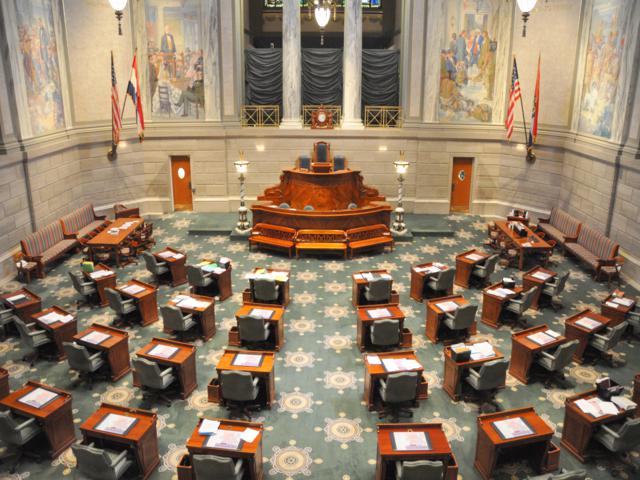JEFFERSON CITY, Mo. – Missouri’s Republican lawmakers continue targeting tax credits as the answer to reduce spending in the Show-Me State, and the latest Senate bill to seek perfection is looking to place caps on the state’s Historic Preservation Tax Credits.
SB 590, sponsored by Sen. Dan Hegeman, began as a plan to cap the tax credits at $50 million, but the version of the bill heard on the Senate floor raised that level to $70 million. That number would equate to half of the current cap.
Speaking on his bill, Hegeman posed a question to his fellow senators, asking them to have the discussion and weight the benefits of the tax credit as opposed to the financial needs of the state.
Hegeman said the program cost more than 10 years ago, where it once carried a price tag of roughly $15-20 million.
“I can’t stand here and justify 140 million dollars going to that program,” Hegeman said. “Are we, today, able to keep putting that kind of money into the program? I think not.”
Discussing the bill with the sponsor, Sen. Bob Onder said that “As long as this remains the third wheel in Missouri politics and we refuse to have the courage and fortitude to tackle this issue,” they would not be able to fiscally set the state’s proverbial house in order.
But those sentiments were not shared by all in the chamber, with several senators inquiring of Hegeman about his intent with the bill.
“Why do you feel a need to do this?” Sen. Jamilah Nasheed asked Hegeman. “If we maxed out the cap, that tells me that there is a demand, so what rationale tells you we need to reduce this?”
“Giving out historic preservation tax credits is not a basic function of government,” Hegeman said, reiterating that he intended this to be a conversation about weighing the needs of the state.
Hegeman’s bill would modify the tax credit by making it discretionary, rather than an entitlement, and requires the Department of Economic Development to “consider additional factors” such as the projected net fiscal benefit of the project, the overall size and quality of the project, the level of economic distress in the area, and input from the local municipality as to the importance of the project to the municipality.
The DED “shall have the ability to disapprove an application for a tax credit based on these factors,” and if they decide a tax credit shall be awarded, the “credit shall be the least amount to cause the project to occur, not to exceed twenty-five percent of eligible costs. “
“Would these projects go forward without the tax credits?” Hegeman asked. “If it is a good project, and benefits the area, it probably would.”
Sen. Bob Dixon noted that, while the projects are open statewide, the tax credits seem to go to certain areas of the state, presumably because, as Sen. Scott Sifton said, “people had been there longer.”
“We should probably be spending this in some areas that need to be worked on,” Sen. John Rizzo conceded. “I’ve seen some amazing stuff, and would never want to scrap the program, but maybe re-focus some of it to some of the impoverished areas.”
Sen. Rob Schaaf filed an amendment to the bill removing the Capitol Complex and Public Building Preservation tax credit acts.
“This bill doesn’t do anything for peace, health, and welfare of the public,” Schaaf said while putting forward the amendment. “If we want to do this, we should just appropriate the money, we don’t need charity from the people.”
And after more than two hours of debate, Sen. Hegeman asked the bill be laid over to the informal calendar.
No support for Hegeman’s bill on historic tax credits in Local Government and Elections
Benjamin Peters was a reporter for The Missouri Times and Missouri Times Magazine and also produced the #MoLeg Podcast. He joined The Missouri Times in 2016 after working as a sports editor and TV news producer in mid-Missouri. Benjamin is a graduate of Missouri State University in Springfield.











